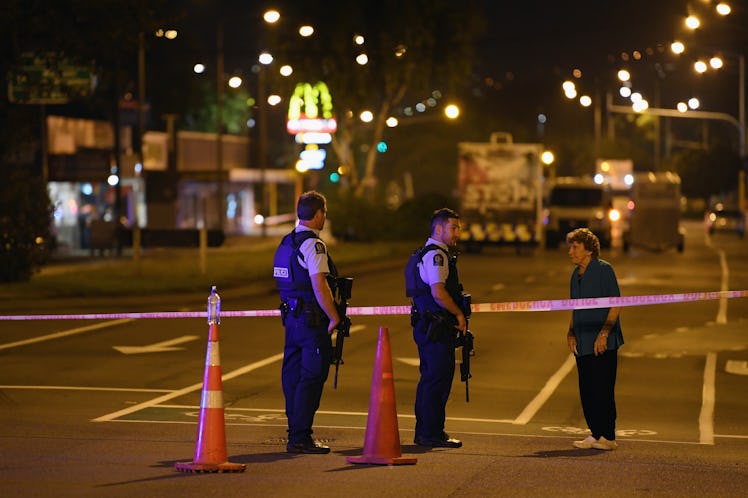
Here's What To Know About Gun Laws In New Zealand
If you haven't heard the sad news, New Zealand experienced its deadliest shooting in decades on Friday, March 15. As is the case in any situation like this, people are speaking out and sharing their thoughts, condolences, and more. But many are also wondering how tragedies like this could happen, discussing factors like white nationalism, Islamophobia, and access to weapons. While mass shootings are complicated and there's rarely one thing that can be pointed to as a ole cause, there are some things that we can have some definitive answers on. For example, what are New Zealand's gun laws?
According to multiple reports, a man entered two mosques in Christchurch, New Zealand, on Friday, March 15, killing at least 49 and injuring many others. Per The Washington Post, the shooter used a semiautomatic rifle and shotgun, including at least one rifle which appeared to be covered with white nationalist slogans. There is as yet no indication of how the shooter obtained the weapons, and whether they were legal or not.
According to GunPolicy.org, which tracks global gun laws, "Among developed nations [New Zealand] stands alone with the United States as the only two countries without universal gun registration." While the country does have gun laws, they're said to be a lot more relaxed than Western countries (outside of the United States). For example, per The Guardian, New Zealand allows its citizens to own semi-automatic military-style assault weapons, which are banned for private ownership in the United Kingdom and Australia. The Guardian also notes that guns can be sold on the internet or through newspaper ads, much like the United States. And any person over the age of 16 that has an entry-level firearm license "can keep any number of common rifles and shotguns without having to register them."
According to CNN, New Zealand police estimate that there are 1.2 million gun owners in the county, which breaks down to one gun for about every three people (New Zealand has a population of about 4.7 million). For comparison purposes, the Pew Research Center estimated in 2013 that there are 89 to 100 guns for every 100 Americans, which equates to one firearm per person — although notably, only about 20 to 30 percent of Americans actually own guns, per a Washington Post survey published in 2018.
Despite the relatively high levels of gun ownership and ease of access, the country has seen limited gun violence when it comes to murders. There hasn't been a mass shooting in New Zealand since 1990, when a man killed 13 people following a dispute with a neighbor, per The New York Times.
The shooting opened the floor for conversations around tighter gun laws, and in 1997, police commissioners recommended that semi-automatic military-style rifles be banned and subject to a mandatory buyback, according to the New Zealand Police website. However, as The Guardian reports, "none of the recommendations of that report have been implemented." The lack of inaction has prompted an outpouring of tweets like these following the latest shooting:
"Such a horrific terrorist attack as the #ChristchurchMosqueAttack could have been prevented," one person tweeted.
Meanwhile, the last major gun control legislation passed in the United States was the 1994 Violent Crime Control and Law Enforcement Act, signed by President Bill Clinton, which banned 19 types of semiautomatic assault weapons, among other things, per TIME. However, the ban, which was provisional and only set to last 10 years, lapsed in 2004 when Congress decided not to extend it. Since, politicians like Sen. Dianne Feinstein (D-California) have been trying to pass a new version of the bill, to no avail, per The Los Angeles Times. In recent years, students and young adults have stepped up to the plate to call for tighter gun control laws, including bans on assault weapons and high-capacity magazines.
We'll see what happens moving forward. Stay tuned.